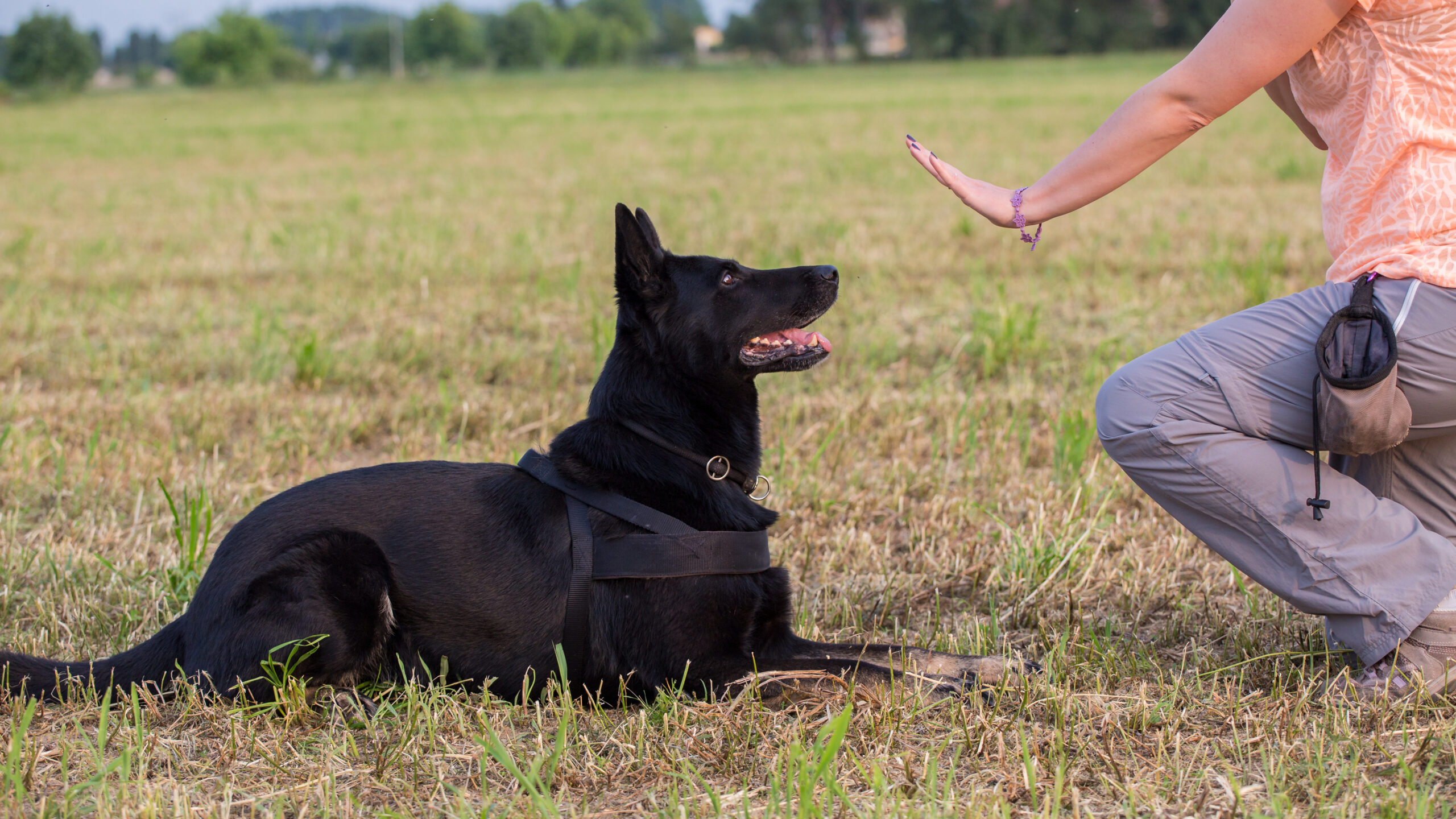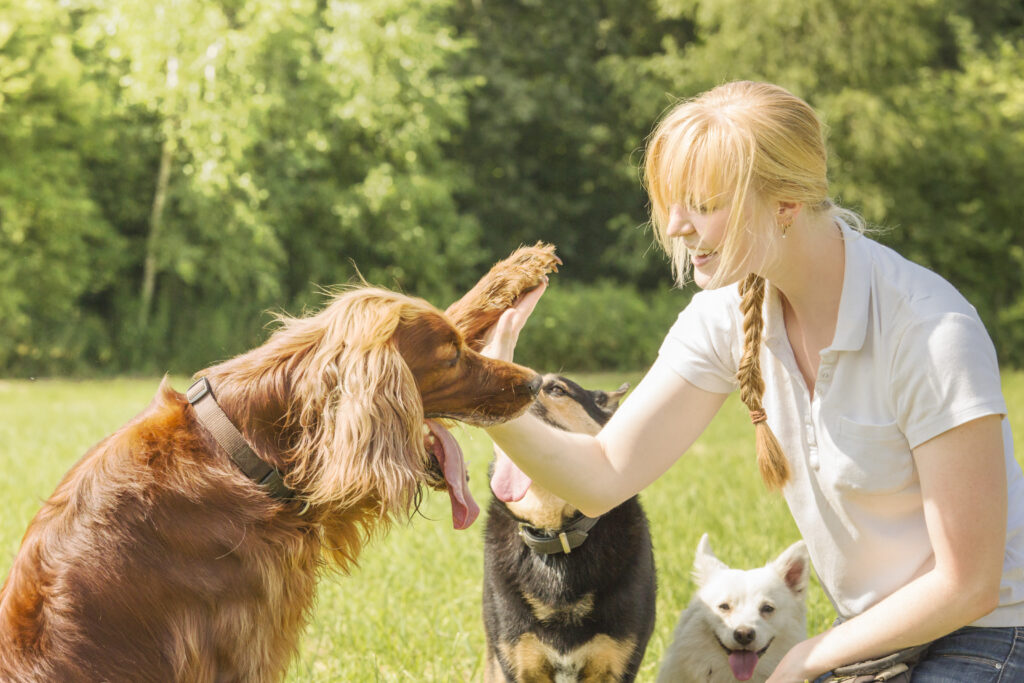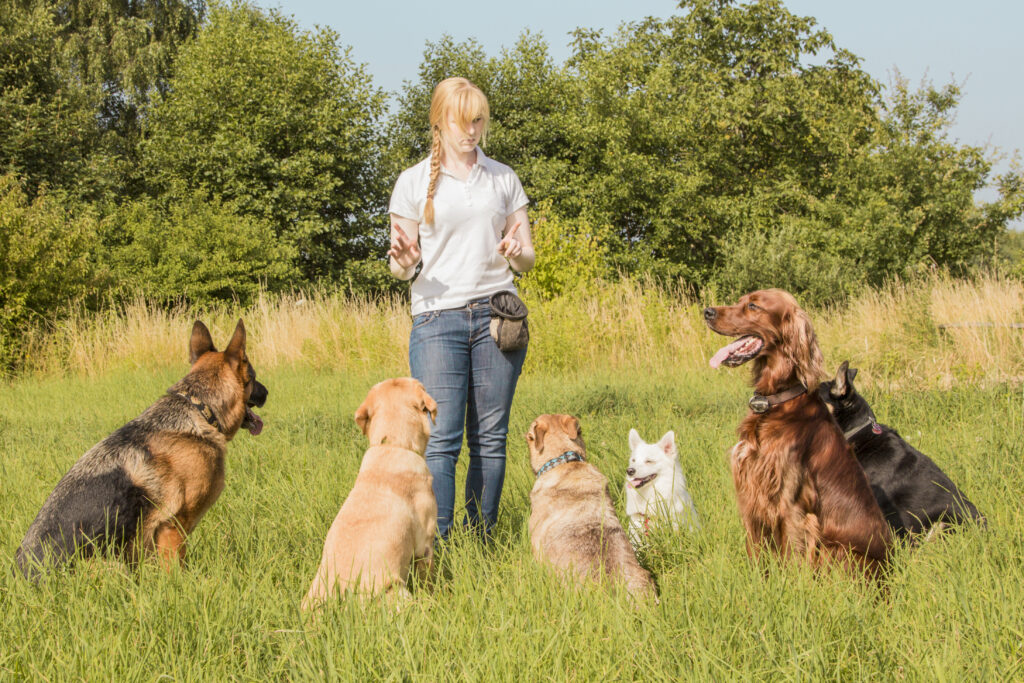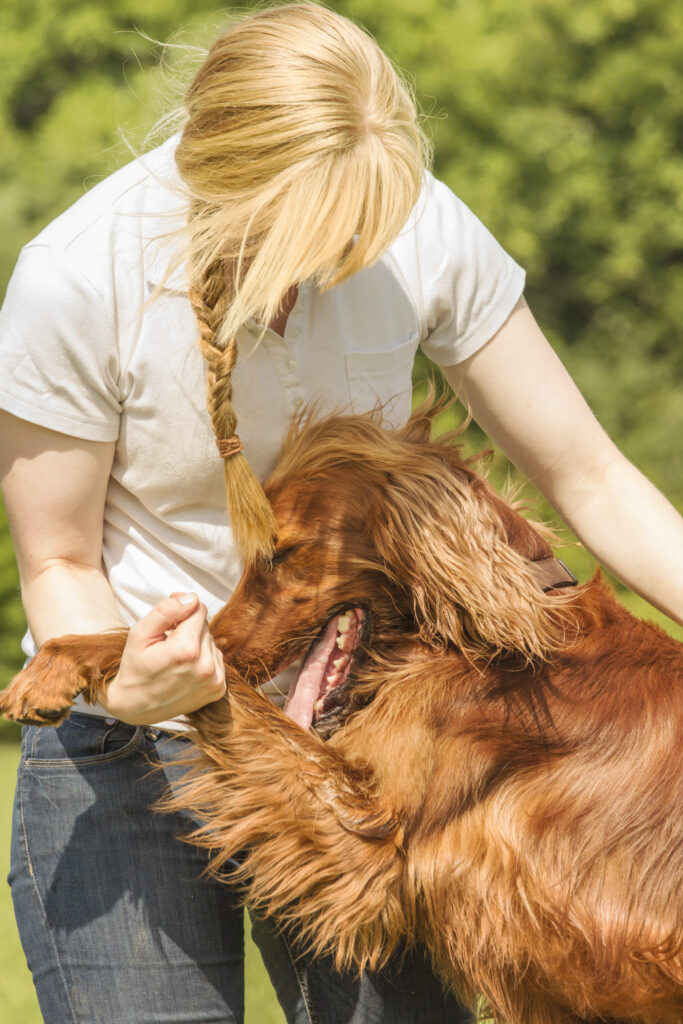
Tips For Finding A Dog Trainer and Questions to Ask
Training your dog is an incredibly important task. That’s why it’s a good idea to seek professional help. But how do you know which trainer is the right one? After all, the dog training industry isn’t regulated. When it comes to training methods for dogs, there are various approaches, and it’s essential to find a method that aligns with your dog’s personality and your training goals. Additionally, when looking for a dog trainer, asking the right questions is crucial to ensure that they are the right fit for you and your furry friend. Get started by reading this article. It will teach you how to choose a skilled, reliable trainer.
Your Dog’s Training Needs and Goals

Before you can choose a trainer, you have to know what you need and want, and what you want your dog to learn or do. What are you needing training for:
- Basic Obedience
- Advance Training
- Agility Training
- Therapy Animal Training
- Service Animal Training
- Personal Protection
- Behavioral Issues (i.e Aggression, Separation Anxiety, ADHD, OCD)
Different trainers specialize in different areas. So, make sure the trainer you choose is equipped to provide the training your dog requires.
Dog Trainer Vs. Behaviorists
If your dog is having behavior issues, not all dog trainers are necessarily behaviorists, but many modern and reputable dog trainers incorporate principles from behavioral science into their training methods. Behavioral science, especially applied behavior analysis, forms the basis for understanding and modifying animal behavior, including dog behavior.
A behaviorist, in the context of dog training, is typically someone who has specialized education in animal behavior, often holding advanced degrees in fields like ethology or applied animal behavior. Behaviorists are trained to analyze and modify animal behavior, taking into account factors such as learning theory, environmental influences, and the animal’s natural instincts.
Types of Dog Training Methods:
There are various types of dog training methods, each with its own philosophy and techniques. Trainers can often use a mix of these training methods or focus on one method.
Positive Reinforcement: Rewards good behavior with treats, praise, or toys. Encourages dogs to repeat desired behaviors.
Clicker Training: Associates a clicking sound with positive reinforcement. Provides a clear signal for desired behavior.
Negative Reinforcement: Removes an aversive stimulus when the dog behaves correctly. Encourages the dog to avoid or stop undesirable behaviors.
Marker Training: Uses a specific word or sound as a marker for good behavior. Helps dogs associate the marker with positive consequences.
Relationship-Based Training: Focuses on a more individualized approach for both dog and human. It is the relationship between dog and human that drives everything. Fostering communication, and strengthening their bond.
Alpha Dog / Dominance Training: Establishes the owner as the “alpha” or dominant figure. Emphasizes the pack hierarchy and structure.
Scientific Training: Utilizes principles of animal behavior and learning. Relies on evidence-based methods.
Electronic Collar Training: Uses remote-controlled collars to deliver stimuli. Can be controversial and should be used with caution.
Behavior Modification: Addresses and changes specific behaviors. Targets and corrects problematic actions.
Balanced Dog Training: Combines both positive reinforcement techniques and correction-based methods. The goal is to strike a balance between rewards for desired behaviors and consequences for unwanted behaviors.
Where to Start Looking
At this point, you are ready to start looking at your options. First, get referrals from people you trust.
That could include your:

Questions to Ask Trainers
Questions to Ask When Interviewing a Dog Trainer:
- What are your Training Methods?
- Ensure their methods align with your values and the temperament of your dog.
- Ask them to explain the Method.
- Terms can be used as marketing tactics.
- What is Your Training Philosophy?
- Understand their overall approach and mindset towards dog training.
- Can I Observe a Training Session or Class? Meet a Current Client in Training?
- Can I Attend/Participate in a Training Session?
- Witnessing a session can provide insight into the trainer’s techniques.
- Can You Provide References?
- Ask for testimonials or references from previous clients.
- Can I review your Contract/ Service Agreement?
- Do You Offer Group or Private Sessions?
- Choose based on your dog’s needs and your preference.
- What Experience Do You Have with Breed/Issue?
- Ensure the trainer has relevant experience with your dog’s breed or specific behavioral issues.
- What Tools (if any) are used in the Training Process? When are they used?
- Tools can be treats, toys, markers, clickers, Shock/E-collars, Pinch/Pronge/Choke collars or leashes.
- How Do You Handle Behavioral Issues or Aggression?
- Assess their expertise in dealing with challenging behaviors.
- What is the Expected Duration of Training?
- Have a realistic expectation of the time commitment required.
- Are You Certified or Accredited? Where/who did you learn from?
- Certification indicates a commitment to professional standards.
- What Follow-up Support is Provided? How Long?
- Check if there are follow-up sessions or support after the initial training.
Look for A Properly Educated and Professional Trainer
You must choose a trainer that has sufficient skills and knowledge. But trainers aren’t required to go through any formal programs. That means anyone can claim they are canine experts. So, if you want to make sure the person you choose knows how to train, find someone who is certified.
Just remember, not all highly skilled professionals have gone through certification programs. Some have earned their expertise through apprenticeships or jobs in the Zoological, Military, or Police Sector. So, if a promising-looking trainer isn’t certified, you don’t need to automatically cross that person’s name off the list. Instead, ask the trainer how his or her skills were acquired.

There are lots of different certifications and associations out there. Here are just a few of them:
- Certificate in Training and Counseling (CTC) from the Academy for Dog Trainers
- KPA CTP from the Karen Pryor Academy
- · VSA-CDT from the Victoria Stilwell Academy program
- CPDT-KA, CPDT-KSA, or CBCC-KA from the Certification Council for Professional Dog Trainers
- PCT-A or PCBC-A from the Pet Professional Accreditation Board
Read Customer Testimonials
When you’ve found a few good options, narrow down your choices by reading customer testimonials. Make sure to review both good and bad reviews. These testimonials will give you some insight into how successful the trainer has been.
Look Up the Trainer on Social Media
Look up any trainers you are considering on social media. They likely have accounted for their training businesses. Take a look at their posts to get an idea of their training philosophy. Make sure it’s in line with your own and takes your dog’s well-being into account. Also, take note of any pictures they post of their clients. If the dogs look happy and relaxed (loose body, neutral positions of ears and tails) while working with the trainer, that’s a good sign.
In Conclusion
Finding a skilled dog trainer you can trust is incredibly important. That’s why you need to do your research. Get started today by following the steps in this article.
About the Author:
Savanna Westwood
Savanna Westwood is the Owner and Founder of The Savvy Sitter, Pet Sitting and Dog Walking, LLC. She has grown up with animals all her life and enjoys spending time with them. Savanna has lived in the Winter Garden and Windermere Area for over 30 years. When she is not taking care of Fur Friends, one can find her reading, practicing archery, riding, and devising ways to provide additional and excellent services to clients. Savanna is a Certified Professional Pet Sitter with Pet Sitter International's CPPS certification and also holds certification in Pet First Aid and CPCR for Pet-Care Professionals.


Great job! There are various locations to seek a suggestion for a trainer, from folks at the dog park to lifelong dog owners. Moreover, you may also check into dog obedience schools or perform a search on social media for the same. However, before selecting, look at the trainer’s certification and expertise in dog training.
Agreed, I believe we made that point in the Blog along with several recommended Certifications